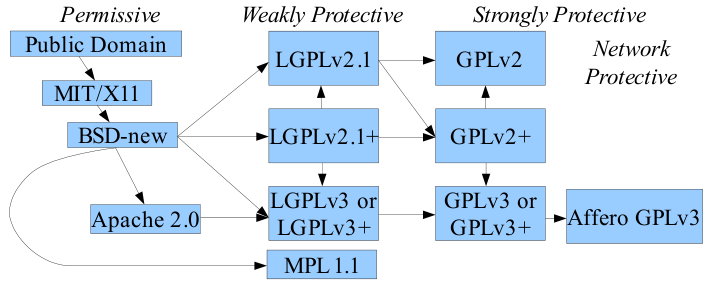-
Notifications
You must be signed in to change notification settings - Fork 9
Compare Open Source Licenses #41
Comments
OverviewThe following pages give an overview about the topic and introduce the most important licenses and further resources. "A Short Guide To Open-Source And Similar Licenses" - (link)by Cameron Shapman, Smashing Magazine, 2010
Keywords
Further links
"HOWTO: Pick an open source license" (Part 1, Part 2)by Ed Burnett, ZDNet, 2006 This article gives a guide about making the right decisions about what you want from a license and discusses more options then the first article does. Questions to ask, when choosing a license:
Licenses discussed (and which questions are answered "yes",
If necessary it is possible to ask a user to fulfil additional requirements before a license is granted. This leads to multi licensing of the same software, i.e. FOSS usage gets GPL license while commercial usage must pay for an individual license. Keywords
Further Links
"Understanding Open-Source Licensing" (link)Ben Adida, OpenACS, Year unknown This article doesn't discuss how to choose an open source license, but rather how and why those licenses exist. It explains what copyright is and what might be considered a derivative work, that every developer owns the copy right on his specific small part of a project, and that licensing is done for the whole project. That means earlier or later a lot of people need to be involved, if changes to the licensing of a project should be done. Therefore and because some licenses state it explicitely, a license shoulde be considered static, once a project decided for it. It also talks about the GPL, which is often called *copyleft because it trys to use copyright laws to deactivate copyright itself. Keywords
Further LinksDebian Free Software Guidelines & FAQ (Social Contract with DFSG, FAQ)
Keywords
Further Links"What is free software?" (link)Free Software Foundation, Year unknown
Keywords
"Make Your Open Source Software GPL-Compatible. Or Else." (link)David A. Wheeler, 2002-2013
Keywords
Further Links
"Fear of Forking" (link)Rick Moen, EMail, 1999
"Freedom Fighters" (link)Jeremy Allison, tuxdeluxe.org, 2007
Copyright vs. Copyleft Licencing and Software Development (download)Massimo D'Antoni, Maria Alessandra Rossi, Department of Economics and Statistics, University of Siena
Keywords
"Why you should use a BSD style license for your Open Source Project" (link)
"'The BSD License Problem" (link)
WikipediaThere are different articles on Wikipedia, which are handled in short in this chapter.
Other links
|
Licenses - Informational ResearchTODO:
Open Source Definition by Open Source Initiative (link)
In Detail:
Free Software Definition by FSF (link)
The Four Freedoms
GPL (license in version 3, FAQ)
Keywords
Mozilla Public License (overview, text, FAQ)
Keywords
PSF LICENSE AGREEMENT FOR PYTHON 2.7.4 (link)
Apache 2.0 License (link, FAQ, GPL compatibility, application)
Keywords
BSD Licenses (3-clause, 2-clause)
MIT/X11 License (link)
Creative Commons CC0 (text, application)
Public Domain
|
License comparisonTODO: Review and add links. It's not much more then brain storming now. History
What is FOSS?
License Compatibility OverviewCompatibility Chart, taken from David A. Wheeler, 2007 If your software is directly or indirectly reachable by the license of a software package you want to use, then both are compatible. It is possible to reach GPLv3 from BSD-new so a GPLv3 project can use BSD-new licensed code. The other way is not possible, because no arrows go from GPLv3 to BSD-new, not even indirectly. OptionsIf there is not a very special situation one of the following 2 should be chosen: A. GPLv3 (and later)
http://www.oss-watch.ac.uk/apps/licdiff/ C. Docs: CC-BY-SA 3.0
Finding Own Requirements
Other things to consider:
Future Legal Risks
GPLv3 or later
Apache License 2.0
Summary of Alternatives
Decision Advice
Decision Making
|
|
Presentation is prepared. If it is possible to show it in public is still open |
|
Presented and therefore finished. |
|
Current status March 2017 from a lawyer: https://writing.kemitchell.com/2017/03/29/OSS-Business-Perception-Report.html# Summary: If you want to license FOSS source code
Conclusion is that GPLv2 would've been slightly better for MONK than GPLv3+. |

Problem
MONK has no real open source license yet.
Solution
Find out, what the keywords in licensing are, which are the most important open source licenses and on which basis they can be compared. Detail the information about the resources used for the research as well as the differences between those licenses, so that based on this issue a decision can be made, which license is to be applied to MONK.
Notes
This issue contains only the texts linked here and a presentation in the Google Driver folders of DResearch Fahrzeugelektronik GmbH. A review of the presentation should be sufficient to close this Issue.
The text was updated successfully, but these errors were encountered: